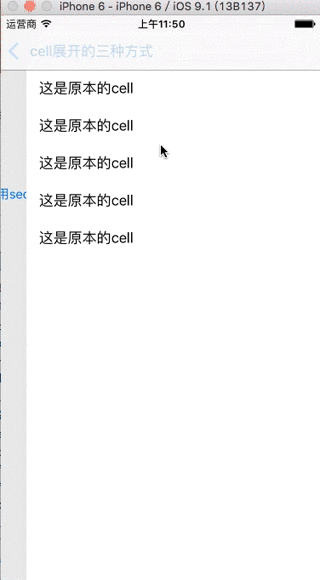cell展开的几种方式
一.插入新的cell
原理:
(1)定义是否展开,和展开的cell的下标
@property (assign, nonatomic) BOOL isExpand; //是否展开
@property (strong, nonatomic) NSIndexPath *selectedIndexPath;//展开的cell的下标
(2)创建两个不同的cell

- (UITableViewCell *)tableView:(UITableView *)tableView cellForRowAtIndexPath:(NSIndexPath *)indexPath {
UITableViewCell *cell;
if (self.isExpand && self.selectedIndexPath.row < indexPath.row && indexPath.row <= self.selectedIndexPath.row + ExpandCount) { // Expand cell
cell = [tableView dequeueReusableCellWithIdentifier:@"CsutomExpansionCell" forIndexPath:indexPath];
} else { // Normal cell
cell = [tableView dequeueReusableCellWithIdentifier:@"CustomCell" forIndexPath:indexPath];
}
return cell;
}
(3)创建你需要的cell的数量
if (self.isExpand) {
return CellCount + ExpandCount;
}
return CellCount;
(4)点击的时候向点击的cell下面插入你需要展示的cell(可展开多个),再次点击删除
- (void)tableView:(UITableView *)tableView didSelectRowAtIndexPath:(NSIndexPath *)indexPath {
if (!self.selectedIndexPath) {
self.isExpand = YES;
self.selectedIndexPath = indexPath;
[self.tavleView beginUpdates];
[self.tavleView insertRowsAtIndexPaths:[self indexPathsForExpandRow:indexPath.row] withRowAnimation:UITableViewRowAnimationTop];
[self.tavleView endUpdates];
} else {
if (self.isExpand) {
if (self.selectedIndexPath == indexPath) {
self.isExpand = NO;
[self.tavleView beginUpdates];
[self.tavleView deleteRowsAtIndexPaths:[self indexPathsForExpandRow:indexPath.row] withRowAnimation:UITableViewRowAnimationTop];
[self.tavleView endUpdates];
self.selectedIndexPath = nil;
} else if (self.selectedIndexPath.row < indexPath.row && indexPath.row <= self.selectedIndexPath.row + ExpandCount) {
} else {
self.isExpand = NO;
[self.tavleView beginUpdates];
[self.tavleView deleteRowsAtIndexPaths:[self indexPathsForExpandRow:self.selectedIndexPath.row] withRowAnimation:UITableViewRowAnimationTop];
[self.tavleView endUpdates];
self.selectedIndexPath = nil;
}
}
}
}
#pragma mark - other
- (NSArray *)indexPathsForExpandRow:(NSInteger)row {
NSMutableArray *indexPaths = [NSMutableArray array];
for (int i = ; i <= ExpandCount; i++) {
NSIndexPath *idxPth = [NSIndexPath indexPathForRow:row + i inSection:];
[indexPaths addObject:idxPth];
}
return [indexPaths copy];
}
二.在不同的section里插入cell
原理:
(1)定义是否展开,和展开的cell的下标
(2)创建两个不同的cell
- (UITableViewCell *)tableView:(UITableView *)tableView cellForRowAtIndexPath:(NSIndexPath *)indexPath {
UITableViewCell *cell;
if (self.isExpand && self.selectedIndexPath.section == indexPath.section) { // Expand Cell
cell = [tableView dequeueReusableCellWithIdentifier:@"CsutomExpansionCell" forIndexPath:indexPath];
} else { // Normal Cell
cell = [tableView dequeueReusableCellWithIdentifier:@"CustomCell" forIndexPath:indexPath];
}
return cell;
}
(3)创建你需要展示普通状态下cell,section的数量
- (NSInteger)numberOfSectionsInTableView:(UITableView *)tableView {
return SectionCount;
}
(4)改变你展开的时候,展开的section的cell的数量
- (NSInteger)tableView:(UITableView *)tableView numberOfRowsInSection:(NSInteger)section {
if (self.isExpand && self.selectedIndexPath.section == section) {
return + ExpandCount; //多个数量
}
return ;
}
(5)点击的时候向点击的cell的section内插入你需要展示的cell(可展开多个),再次点击删除
- (void)tableView:(UITableView *)tableView didSelectRowAtIndexPath:(NSIndexPath *)indexPath {
if (!self.selectedIndexPath) {
self.isExpand = YES;
self.selectedIndexPath = indexPath;
[self.tableView beginUpdates];
[self.tableView insertRowsAtIndexPaths:[self indexPathsForExpandSection:indexPath.section] withRowAnimation:UITableViewRowAnimationTop];
[self.tableView endUpdates];
} else {
if (self.isExpand) {
if (self.selectedIndexPath == indexPath) {
self.isExpand = NO;
[self.tableView beginUpdates];
[self.tableView deleteRowsAtIndexPaths:[self indexPathsForExpandSection:indexPath.section] withRowAnimation:UITableViewRowAnimationTop];
[self.tableView endUpdates];
self.selectedIndexPath = nil;
} else if (self.selectedIndexPath.row != indexPath.row && indexPath.section <= self.selectedIndexPath.section) {
// Select the expand cell, do the relating dealing.
} else {
self.isExpand = NO;
[self.tableView beginUpdates];
[self.tableView deleteRowsAtIndexPaths:[self indexPathsForExpandSection:self.selectedIndexPath.section] withRowAnimation:UITableViewRowAnimationTop];
[self.tableView endUpdates];
self.selectedIndexPath = nil;
}
}
}
}
- (NSArray *)indexPathsForExpandSection:(NSInteger)section {
NSMutableArray *indexPaths = [NSMutableArray array];
for (int i = ; i <= ExpandCount; i++) {
NSIndexPath *idxPth = [NSIndexPath indexPathForRow:i inSection:section];
[indexPaths addObject:idxPth];
}
return [indexPaths copy];
}
三.更改cell的高度
原理:
(1)定义是否展开,和展开的cell的下标
(2)创建一个的cell,分上半部分和下半部分
(3)创建cell的高度,分普通情况下的高度和展开后的高度
- (CGFloat)tableView:(UITableView *)tableView heightForRowAtIndexPath:(NSIndexPath *)indexPath {
if (self.isExpand && self.selectedIndexPath == indexPath) {
return ;
} else {
return ;
}
}
(4)点击的时候向点击的cell刷新点击的cell
- (void)tableView:(UITableView *)tableView didSelectRowAtIndexPath:(NSIndexPath *)indexPath {
if (!self.selectedIndexPath) {
self.isExpand = YES;
self.selectedIndexPath = indexPath;
[self.tableView beginUpdates];
[self.tableView reloadRowsAtIndexPaths:@[indexPath] withRowAnimation:UITableViewRowAnimationFade];
[self.tableView endUpdates];
} else {
if (self.isExpand) {
if (self.selectedIndexPath == indexPath) {
self.isExpand = NO;
[self.tableView beginUpdates];
[self.tableView reloadRowsAtIndexPaths:@[indexPath] withRowAnimation:UITableViewRowAnimationFade];
[self.tableView endUpdates];
self.selectedIndexPath = nil;
} else {
self.isExpand = NO;
[self.tableView beginUpdates];
[self.tableView reloadRowsAtIndexPaths:@[self.selectedIndexPath] withRowAnimation:UITableViewRowAnimationFade];
[self.tableView endUpdates];
self.selectedIndexPath = nil;
}
}
}
}
四.自定义section,点击展开相应的cell(下午有空写...)
demo链接
http://pan.baidu.com/s/1c0YQDNE
效果图

cell展开的几种方式的更多相关文章
- cell重用的几种方式
1.使用xib重用 //ios6 之后推荐大家使用的重用方式 //动态的使用self获得当前类名,来作为唯一的标示 NSString * identifier = NSStringFromClass( ...
- .NET环境下导出Excel表格的两种方式和导入两种类型的Excel表格
一.导出Excel表格的两种方式,其中两种方式指的是导出XML数据类型的Excel(即保存的时候可以只需要修改扩展名为.xls)和真正的Excel这两种. using System; using Sy ...
- Android数据存储五种方式总结
本文介绍Android平台进行数据存储的五大方式,分别如下: 1 使用SharedPreferences存储数据 2 文件存储数据 3 SQLite数据库存储数据 4 使用Cont ...
- Excel导出的几种方式
1.html 前台html与js代码(文件:ExportExcelByHtml.aspx): <html xmlns="http://www.w3.org/1999/xhtml&quo ...
- C++创建对象的两种方式
C++创建对象有两种方式,在栈上创建对象(Objects on the Stack)和在堆上创建对象(Objects on the Heap). 假设我们有以下的类: #include <str ...
- Linux就这个范儿 第15章 七种武器 linux 同步IO: sync、fsync与fdatasync Linux中的内存大页面huge page/large page David Cutler Linux读写内存数据的三种方式
Linux就这个范儿 第15章 七种武器 linux 同步IO: sync.fsync与fdatasync Linux中的内存大页面huge page/large page David Cut ...
- 实现顶部轮播,下部listview经典布局的两种方式
开头: 在做android开发的时候,我们经常会遇到这样的布局,上面是一个图片轮播图,下面是一些列表的项目.很多新闻app,视频类app都采用这样的布局.起初的时候 由于没有很多参考,我自己想到了一种 ...
- java开发webservice的几种方式(转载)
webservice的应用已经越来越广泛了,下面介绍几种在Java体系中开发webservice的方式,相当于做个记录. 1.Axis2方式 Axis是apache下一个开源的webservice开发 ...
- 加载xib文件的两种方式
一.加载xib文件的两种方式 1.方法一(NewsCell是xib文件的名称) NSArray *objects = [[NSBundle mainBundle] loadNibNamed:@&quo ...
随机推荐
- 《超实用的HTML代码段》阅读笔记1——HTML5自动聚焦
在页面加载完成后自动将输入焦点定位到需要的元素,用户就可以直接在改元素中进行输入而不需要手动选择它. 通过autofocus的属性就可以指定这种自动聚焦的功能,示例代码如下: <form nam ...
- Web开发者应掌握的12个Firebug技巧
来源: 廖煜嵘 相信很多从事Web开发工作的开发者都听说和使用过Firebug,但可能大部分人还不知道,其实它是一个在网页设计方面功能相当强大的编辑器,它 可以对HTML.DOM.CSS.HTTP和J ...
- 查看mysql已有用户并删除
查看: SELECT DISTINCT CONCAT('User: ''',user,'''@''',host,''';') AS query FROM mysql.user; 删除: drop us ...
- ubuntu 14.04 构建openstack使用的ubunt 16 的桌面版的使用镜像
1. 下载ubuntu 16.04桌面版的iso文件,我的个人网盘中有,可以下载 https://pan.baidu.com/s/14qT3lbbqLwDaejmz2VSkyw 2. 安装制作镜像文件 ...
- shell 简单脚本 2
#!/bin/bash source /etc/profile APPLICATIONS_HOME="/cpic/cpicapp/cpic_analy/jars" APPLICAT ...
- java导入Excel表格数据
首先导入Excel数据需要几样东西 第一需要两个依赖包,这里直接是在pom注入依赖 <!--excel--> <dependency> <groupId>org.a ...
- 【page-monitor 前端自动化 下篇】 实践应用
转载文章:来源(靠谱崔小拽) 通过page-diff的初步调研和源码分析,确定page-diff在前端自动化测试和监控方面做一些事情.本篇主要介绍下,page-diff在具体的实践中的一些应用 核心d ...
- github+hexo+themes搭建简易个性主题博客
0x00 install Node.js and git 安装Node.js:http://www.runoob.com/nodejs/nodejs-install-setup.html 安装git ...
- shell脚本,计算1+3+5....100等于多少?
[root@localhost wyb]# cat unevenjia.sh #!/bin/bash #从1+++...100的结果 i= count=$1 $count` do sum=$(($su ...
- Ubuntu sudo 出现 is not in the sudoers file解决方案
前言: 自己想额外创建一个Linux账户,但是发现新创建的用户(lgq)并不能使用sudo指令. 但是在安装系统时创建的用户(abc)是可以正常使用的. 原因是新创建的用户并没有被赋予使用sudo指令 ...
